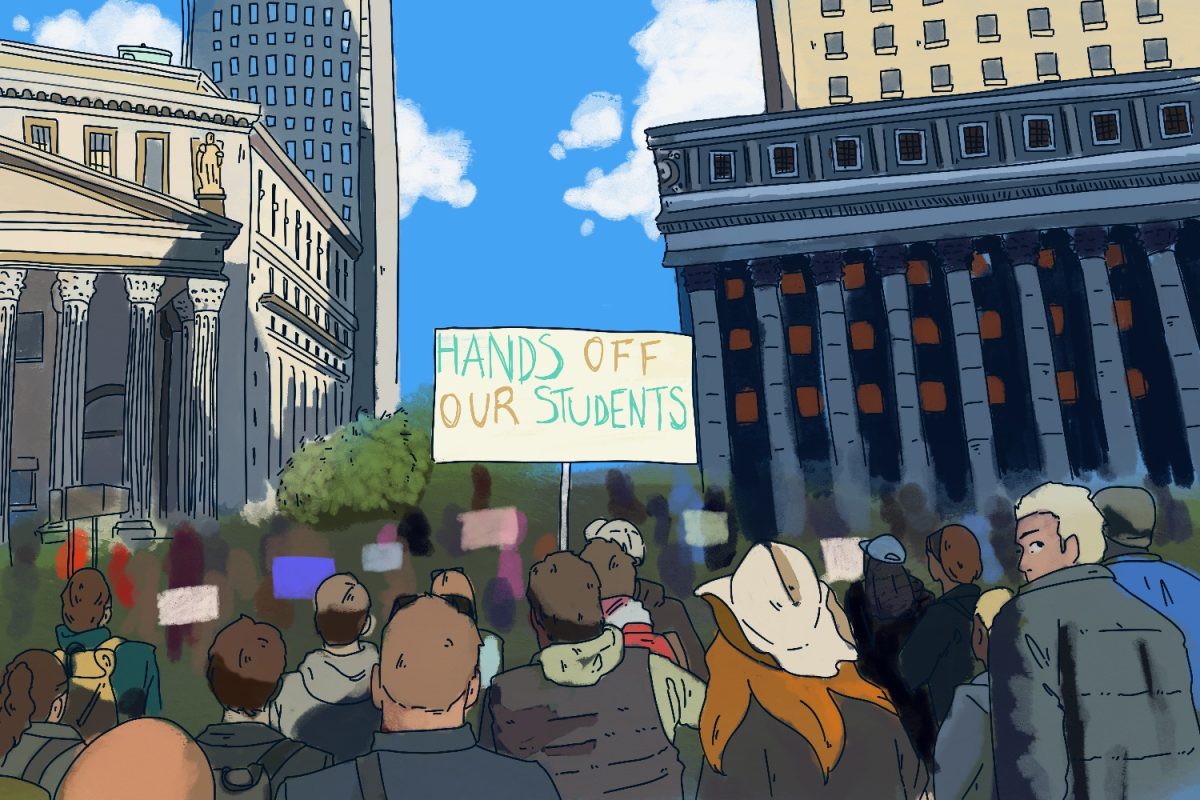Since President Donald Trump took office eight months ago, universities have been wracked with questions about what to expect from his efforts to crack down on international students. Now, over five months after the visa revocations made their way to NYU, students and administrators are hosting additional information sessions to advise students amid a turbulent climate.
This week, two panels focused on international student safety took place across campus. On Tuesday, Wagner student organizers from the Displaced Migrant Action Group hosted “Know Your Rights For International Students and Allies,” featuring information on how to interact with U.S. law enforcement. Two days later, NYU’s Asian/Pacific/American Institute held “International Students in Limbo” with panelists including Ph.D. student Alia ElKattan, historian Manan Ahmed, attorneys Gabriela Calahorrano and Molly Coe, and Sharon Naira, who has a doctorate in comparative literature from NYU.
“All those processes are very confusing, and they’re changing every single day,” Julian Mura-Kröger, Wagner student and organizer of the “Know Your Rights” event, said in an interview with WSN. “So it’s about just making sure that people have a good understanding of the basics of that and what those changes mean.”
Across both events, panelists discussed academic freedom, legal repercussions and immigration-related resources. Here are WSN’s biggest takeaways from attending A/P/A Institute’s panel and speaking with organizers from both events.
Who should concerned NYU students reach out to?
At both events, panelists stressed the importance of international students taking advantage of NYU’s community and resources. They advised students to first reach the Office of Global Services for visa-related help. OGS recommends applying for a visa at least one month — if not three or four months — ahead of the planned arrival time.
Panelists also directed students to NYU School of Law’s Immigrant Defense Initiative, a nonprofit clinic established during the first Trump administration that supports “immigration-related legal needs.” The clinic provides free legal consultations, representation in immigration court and financial need advocacy for NYU students, employees and their families. Mura-Kröger, co-chair of the Displaced Migrants Action Group at NYU’s Robert F. Wagner Graduate School of Public Service, also said that his organization offers tangible support to individuals taken into detention facilities, and is open for all interested students to join as volunteers.
How will current laws affect visa applications for NYU students?
Molly Coe, senior staff attorney at the IDI, said the visa application process, now more than ever, lacks articulation. She said that because more immigration status questions are immediately directed to the federal court system, applicants have fewer opportunities to appeal their cases or denials.
“The stakes are just so high,” Coe said.
Coe noted that she is seeing more cases of H-1B applicants denied status and subject to “swift” deportation proceedings than she ever had in the past — when applicants were able to appeal their denials without repercussions.
OGS recommends that international students planning to study outside of the United States consider that U.S. visa renewals have to be done from their home countries. Students from Trump’s 19 banned countries should also be aware of potentially not being able to return if they require an F-1 or J-1 visa.
Recent policy proposals from the Department of Homeland Security stipulate a strict period of stay in the United States up to four years for study, cutting the current grace period in half. This will require students requesting an extension on their I-20 or DS-2019, a certificate of eligibility for nonimmigrant student status, to apply with the U.S. Citizenship and Immigration Services — a process that will lengthen application wait times and increase costs.
How might immigration policy changes affect free speech?
ElKattan, who organizes with NYU’s graduate student union, said at the A/P/A Institute’s event that students’ immigration protections shouldn’t be affected by their involvement in political activism. Both panels, however, acknowledged that concern may be higher for those publicly affiliated with social organizations — citing students and professors who had been targeted after engaging in pro-Palestinian demonstrations.
“Migration policy seems to be the avenue through which the Trump administration is trying to pursue broader political goals,” Mura-Kröger said. “The people who have been direct recipients of these issues have largely been green card holders, visa holders and asylum seekers.”
He referenced Mahmoud Khalil, a former Columbia University graduate student who was detained and deported after leading pro-Palestinian protests, and Rümeysa Öztürk, a Tufts University Ph.D. candidate who was arrested after writing an pro-Palestinian op-ed, as examples. Coe said that applicants associated with “anti-Americanism” are also more frequently subject to “discretionary denials.”
The union lobbied for NYU to prevent government agencies such as U.S. Immigration and Customs Enforcement from entering campus and probing student information during the last contract negotiation in 2021, according to ElKattan. The push comes after NYU said it “will comply with the law” in dealing with law enforcement searches on campus.
ElKattan emphasized that while students often felt more susceptible to visa revocations if they were politically active, many students with no affiliations have also been targeted.
“I think as international students, first of all, this feeling is not new,” a Steinhardt Ph.D. student, who requested to remain anonymous due to immigration concerns, told WSN. “I think what we see is the next level of anxiety.”
Contact Jake Christy and Kaitlyn Sze Tu at [email protected].

























































































































































